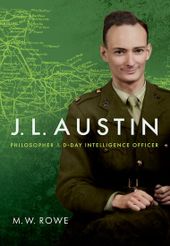
J.L. Austin: Philosopher and D-Day Intelligence Officer
Mark Rowe has just published the first full length biography of the celebrated ordinary-language philosopher, J.L. Austin. The book reveals the true complexity of Austin’s character, and the full range and significance of his achievements, including his lesser known role in planning the D-Day landings. Tonight, Rowe will talk about his new book with philosopher Tamara Dobler and English Literature scholar Rudolph Glitz.
Austere, witty, and formidable, J. L. Austin (1911-1960) was the leader of Oxford Ordinary Language Philosophy and the founder of speech-act theory. Mark Rowe’s book—the first full-length biography of Austin—enhances our understanding of his intellectual prominence in 1950s Oxford, examining the significance of his famous Saturday morning seminars, and his sometimes tense relationships with Gilbert Ryle, Isaiah Berlin, A. J. Ayer, and Elizabeth Anscombe. Throwing new light on Austin’s intellectual development, it probes the strengths and weaknesses of his mature philosophy, and reconstructs his late unpublished work on sound symbolism.
Austin’s philosophical work remains highly influential, but much less well-known is his outstanding contribution to British Intelligence in World War Two. In his book, Rowe thus investigates Austin’s part in the North African campaign, the search for the V-weapons, the preparations for D-Day, the Battle of Arnhem, and the Ardennes Offensive, and shows that, in the case of D-Day, Austin played a major role in the ultimate Allied victory. Tonight, Tamara Dobler and Rudolph Glitz will engage in conversation with Rowe. Together they will explore his findings—ranging from the true complexity of Austin’s character to the full range and significance of his achievements.
About the speakers
Mark Rowe is a former senior lecturer in philosophy at the University of East Anglia, UK. Equally interested in philosophy, literature, and music, he is the author of Philosophy and Literature: A book of Essays (2004), Heinrich Wilhelm Ernst: Virtuoso Violinist (2009), and Philip Larkin: Art and Self (2011). Rowe’s new book J.L. Austin: Philosopher and D-Day Intelligence Officer is the first full-length biography of Austin.
Tamara Dobler is Assistant Professor at the department of philosophy at the Vrije Universiteit Amsterdam. Until recently she was a lecturer at the UvA philosophy, AUC, and Leiden University. Tamara has publications in philosophy of language and its history, with a special focus on the role of extra-linguistic context in language use. Besides contextualism, she specialises in the philosophy of Ludwig Wittgenstein, and is generally interested in ordinary language philosophy and topics in conceptual engineering.
Rudolph Glitz is Assistant Professor at the department of English Literature and Culture at the University of Amsterdam, where he has long been running the English Literature MA programme. He works on age group politics, generation conflicts, and the conceptualization of the life stages in literature, and has published on Modernist family sagas, Shakespeare, and modern poetry.

:rgb(-15)

:rgb(-25)

:rgb(8)
